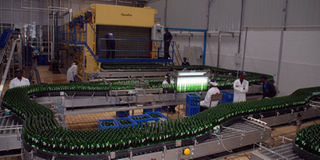Fight for clients in soft drinks market to hot up as Pepsi launches Sh2.6bn plant

PHOTO | SALATON NJAU Seven-Up Bottling Company (SBC) employees at the plant’s packaging unit at Ruaraka in Nairobi on February 18, 2013. After exiting the market in the 1970s, PepsiCo returned to Kenya in 2010.
What you need to know:
- Using a low pricing strategy, the firm is already taking the battle to its rival, Coca-Cola
Global soft drinks giant PepsiCo on Monday commissioned its Sh2.6 billion manufacturing plant in Nairobi setting the stage for cutthroat competition in the local market.
With a production capacity of 600 bottles per minute, the plant, to be run by PepsiCo’s agent, Seven-Up Bottling Company (SBC) Kenya, is expected to cut the company’s operating costs given that it has been relying on imports to supply the local market.
Located at Ruaraka, Nairobi the new plant will produce all the company’s brands already retailing in the Kenyan market —Pepsi-Cola, Mirinda, 7-Up, Evervess and Mountain Dew.
PepsiCo returned to Kenya in 2010, more than 30 years after its exit in the 1970s, opening a fresh battle front for the American soft drinks heavyweight, Coca-Cola, which has dominated the local market for decades.
Take our fair share
“We do understand the competitive nature of the market, the way our competitors are entrenched in this market. But we are also firm believers that with the right steps, we will soon take our fair share of the market,” said SBC’s chairman, Mr Faysal El-Khalil said at the ceremony.
Adopting a low pricing strategy, the company is already taking the fight for market share a notch higher with the introduction of a new 350ml soda bottle set to retail at Sh23, the same price as Coca-Cola’s 300ml bottle.
Last month, the company launched the search for distributors to push its supply of products in Nairobi, Nakuru, Naivasha and Machakos markets and has been spending heavily in marketing and advertising.
SBC has an eight-decade history of distributing PepsiCo products across the globe.
In Africa, the company has operated in Nigeria for 52 years and eleven years in neighbouring Tanzania. SBC also ventured into Ghana recently.
According to Mr El-Khalil, experience and support from these other African units will bolster the nascent operations in Nairobi.
In addition to Coca-Cola, other beverage manufactures which PepsiCo will have to contend with include the East African Breweries Limited (EABL) with its Alvaro brand.
SABMiller is also contemplating entering into the juice market after acquiring Crown Foods, which bottles Keriget Water.
Growing middle-class
Coca-Cola has enjoyed minimal competition since PepsiCo bowed out of the Kenyan market, with attempts by new entrants such as Softa failing to deliver significant impact on the market share.
PepsiCo’s is following in a new wave that has seen multinational companies make huge investments in the region, attracted by a growing middle-class with enough disposable cash to spend on luxury products.
“We are appropriately positioned to leverage the future potential of Kenya as a booming economy and look forward to being closely associated with the country’ prosperity,” El-Khalil said.
He said that the plant was the first phase of the company’s planned investments into the country and it intends to upscale its capacity going forward. With a local production, SBC will edge out parallel importers of PepsiCo products which it says have been eating into its revenue.




